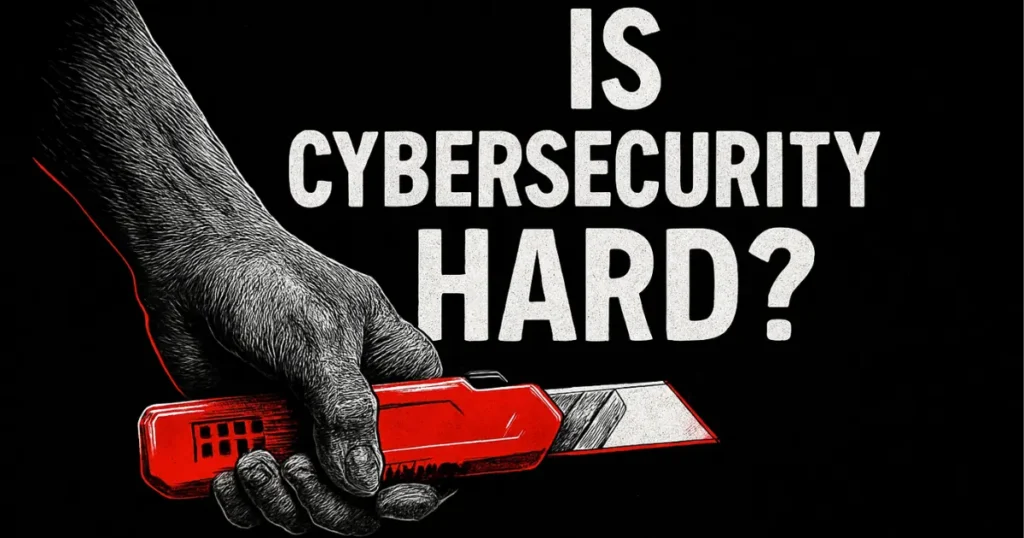
Table of Contents
In today’s fast-paced digital age, cybersecurity stands as a cornerstone for protecting sensitive data and critical systems. A common question arises: Is cybersecurity hard to learn? The truth is, there’s no simple yes or no—mastering it depends on several factors.
Embarking on a cybersecurity journey may seem daunting at first, but it’s one of the most rewarding paths in tech. As the digital landscape continues to evolve, the demand for skilled defenders grows more urgent than ever.
While the learning curve can appear steep, breaking the process into manageable steps makes it far more approachable. Cybersecurity professionals do more than just guard systems—they serve as the frontline defense against cyber threats, safeguarding valuable data and crafting intelligent protection strategies.
Whether you’re a tech enthusiast or someone exploring a career shift, building a foundation in cybersecurity can unlock a world of exciting and impactful opportunities in the tech industry.
Key Takeaways
- Cybersecurity is challenging but learnable with dedication
- Multiple learning paths exist for aspiring cybersecurity professionals
- Technical and soft skills are crucial for success
- Continuous learning is essential in this dynamic field
- Entry-level opportunities are growing rapidly
- Online resources and certifications can accelerate your learning
Understanding the Basics of Cybersecurity
Getting into cybersecurity can feel daunting, but it’s easier when you break it down. Cybersecurity skills are not just for tech experts. They’re important for anyone using the internet. This section will cover the basic ideas that protect your online world.
Learning about cybersecurity starts with knowing what keeps systems safe. Let’s look at the main parts that guard your digital space.
Core Components of Information Security
The CIA triad is key to keeping information safe:
- Confidentiality: Keeping sensitive info from the wrong hands
- Integrity: Making sure data is correct and unchanged
- Availability: Keeping systems open for those who should use them
Common Security Threats and Vulnerabilities
Cybersecurity pros need to know about common dangers. Here are the top threats:
| Threat Type | Primary Risk | Protection Strategy |
|---|---|---|
| Phishing | Credential theft | Email verification |
| Malware | System compromise | Antivirus software |
| Social Engineering | Human manipulation | Security awareness training |
Essential Technical Concepts for Beginners
To get good at cybersecurity, learn these basic tech ideas:
- Encryption techniques
- Network security protocols
- Firewall configuration
- Access control mechanisms
Cybersecurity training isn’t scary. By breaking down big ideas into smaller parts, you can start strong. Remember, every expert was once a beginner. With hard work, you can learn to protect online assets.
Is Cybersecurity Hard? Breaking Down the Learning Curve
Starting in cybersecurity might seem daunting, but knowing the learning curve helps. Is cybersecurity hard? It really depends on how you approach it. With the right mindset and courses, complex topics become easier to learn.
Your journey includes mastering several areas:
- Technical foundations in computer networks
- Understanding system vulnerabilities
- Developing analytical problem-solving skills
- Learning defensive and offensive security strategies
Everyone’s background is different, but it doesn’t matter. People from IT, programming, or other fields can make a great cybersecurity team. The key is having the right attitude and resources.
| Learning Difficulty | Skill Level Required | Recommended Approach |
|---|---|---|
| Beginner | Basic computer knowledge | Online courses, entry-level certifications |
| Intermediate | Networking basics | Advanced cybersecurity courses, hands-on practice |
| Advanced | Strong programming skills | Specialized training, professional certifications |
Continuous learning is crucial in cybersecurity. The field changes fast, so you must keep up. Cybersecurity courses help you stay current and improve your skills.
Your success comes from passion, persistence, and a readiness to tackle tough challenges. While it’s a challenging field, breaking it down makes it achievable and fulfilling.
Essential Skills and Knowledge for a Cybersecurity Career
To start a successful cybersecurity career, you need a plan for learning new skills. The job market wants people who are good at both tech and thinking critically. They also need to be able to adapt quickly.
Starting your cybersecurity career means learning about the many skills needed to do well in this field.
Technical Skills for Cybersecurity Professionals
Being good at tech is key for cybersecurity jobs. You’ll need to learn:
- Network security setup
- Finding and fixing security weaknesses
- Testing systems to find vulnerabilities
- Managing security in the cloud
- Handling security incidents and doing forensic analysis
Critical Soft Skills That Elevate Your Career
But it’s not just about tech skills. You also need to work well with others and communicate clearly:
- Communication – Making complex security ideas easy to understand
- Thinking strategically to solve problems
- Working well in teams
- Keeping up with new threats
- Being good at analyzing information
Programming Languages for Cybersecurity Success
Knowing programming languages can really help your career in cybersecurity. Focus on learning:
- Python – For automating tasks and scripting
- JavaScript – For keeping web apps safe
- C++ – For systems-level security
- SQL – For protecting databases
- Bash – For scripting on Linux systems
By getting good at a wide range of skills, you’ll stand out in the competitive cybersecurity job market.
Getting Started with Cybersecurity Training and Certification
Starting your cybersecurity career means getting the right training and certifications. It’s all about learning and growing in this fast-paced field.
There are many ways to learn about cybersecurity. Here are some key options:
- Online courses from platforms like Coursera and edX
- Intensive cybersecurity bootcamps
- University degree programs in cybersecurity
- Self-paced learning through specialized cybersecurity platforms
Getting certified in cybersecurity can really help your career. Here are some top certifications:
- CompTIA Security+ – Entry-level certification for foundational skills
- Certified Information Systems Security Professional (CISSP) – Advanced credential for experienced professionals
- Certified Ethical Hacker (CEH) – Specialized certification for network security experts
“Continuous learning is the cornerstone of success in cybersecurity” – Industry Expert
When you start your cybersecurity training, focus on practical skills. Hands-on experience is key. Use virtual labs, capture-the-flag competitions, and real-world simulations to learn. Make a plan for your learning that matches your career goals and keeps up with new tech trends.
Investing in good cybersecurity training and respected certifications can lead to great career opportunities. This field is critical and always changing.
Conclusion
Starting a career in cybersecurity might seem tough, but it’s doable with hard work and the right mindset. Is cybersecurity hard? Yes, it demands ongoing learning and dedication. But the benefits are well worth the effort.
The digital world is changing fast, opening up new chances for cybersecurity pros. Your path starts with learning key technical skills and using various learning tools. Keep your curiosity alive. Certifications, online classes, and hands-on experience will help you grow in your career.
As tech keeps evolving, the need for skilled cybersecurity experts will keep rising. You can choose from many areas like ethical hacking, network security, or risk management. Begin with small steps, stay focused, and work on both technical and soft skills. This will make you stand out in this fast-changing field.
Remember, your cybersecurity career is a lifelong learning journey. Face challenges head-on, keep up with new tech, and stay passionate about digital safety. The future of cybersecurity looks bright, and your role in it is huge.
FAQ
Is cybersecurity hard to learn for beginners?
Cybersecurity can be tough, but it’s doable. It needs dedication, constant learning, and practice. Success depends on your motivation, how you learn, and your willingness to understand complex ideas.Many start with basic courses and grow their skills through hands-on experience and specialized training.
What skills do I need to start a career in cybersecurity?
You’ll need technical and soft skills to start. Technical skills include networking, operating systems, basic programming, and security tools. Soft skills like problem-solving, analytical thinking, communication, and adaptability are also key.Many cybersecurity pros come from IT, computer science, or even non-technical fields.
What are the best certifications for cybersecurity?
Top cybersecurity certifications include CompTIA Security+, CISSP, CEH, and SANS GIAC. These show your expertise and can boost your career. Choose one that fits your goals and experience.
How long does it take to become a cybersecurity professional?
Becoming a cybersecurity pro takes time. You can get entry-level certifications in 3-6 months with focused study. A full career path might take 1-4 years, based on your background and learning pace.Many start in roles like security analyst or IT support and move up with more learning and experience.
Do I need a computer science degree to work in cybersecurity?
A computer science degree helps but isn’t always needed. Many cybersecurity pros have varied backgrounds. What matters most are practical skills, certifications, and experience.Online courses, bootcamps, self-study, and certifications can lead to a cybersecurity career.
What programming languages are most useful in cybersecurity?
Useful programming languages include Python, JavaScript, C++, and SQL. You don’t need to be an expert, but knowing these languages can boost your skills and job chances.
What are the biggest challenges in learning cybersecurity?
Big challenges include keeping up with tech changes, understanding complex concepts, and staying ahead of threats. The field demands constant learning and adaptability.You’ll need strong analytical skills, to think like both a defender and an attacker, and to commit to ongoing learning.
What career opportunities exist in cybersecurity?
Cybersecurity offers many career paths, like security analyst, penetration tester, and security engineer. It spans industries like tech, finance, healthcare, and government. With growing threats, job demand is high, offering good salaries and career growth.




Leave a Reply